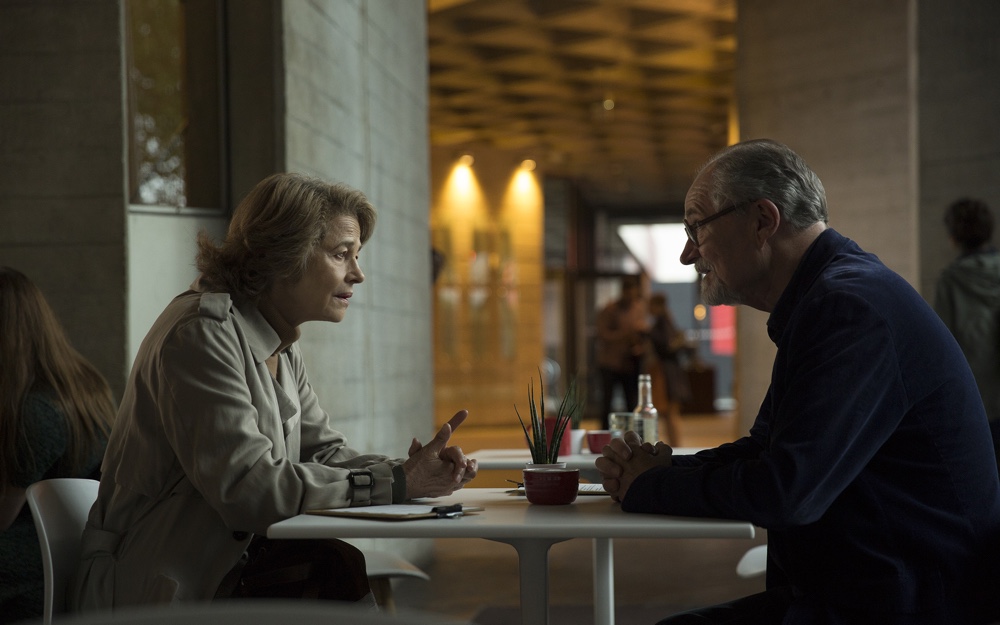The Sense of an Ending
Feb 8, 2018 - 19:30 - Corn Exchange
- Director: Ritesh Batra
- Year: 2017
- Country: UK/USA
- Run Time: 108 mins
- Ratings
- A: 25
- B: 51
- C: 25
- D: 3
- E: 3
- Overall: 71

Jim Broadbent gives an engaging and sympathetic performance in this movie, directed by Ritesh Batra (known for his Mumbai-set heartwarmer The Lunchbox) and adapted by Nick Payne from the 2011 Booker-winning novel by Julian Barnes, who is to be glimpsed fleetingly in the background of a pub scene. It is a film with an intriguing premise and it’s never anything other than watchable and well acted. But, considering that the story is about suicide and forbidden love, it is oddly desiccated, detached, even passionless sometimes. Despite the title, and despite the emphasis on the lead character’s supposed attainment of emotional closure, there is no satisfying sense of an ending. The flashbacks to the leading character’s 1960s youth are important for giving the story depth and drama, and for taking it out of the parochial world of well-to-do north London. The disclosure of assumed mystery in the flashbacks is deferred, scene-by-scene. But the fiery blast of real emotion and real revelation never truly arrives. And it’s difficult to tell how intentional that reticence is. Broadbent plays Tony Webster, a grumpy retiree, divorced from his elegant and beautiful QC wife Margaret (Harriet Walter) and on reasonably good terms with their grownup daughter Susie (Michelle Dockery) who is heavily pregnant and preparing to be a single mother. Amusingly, Tony accompanies Susie to NCT antenatal classes in the place of a partner and embarrasses her horribly with his dad-joke attempts at lightening the mood.Then, Margaret is astonished and quietly angry when Tony takes her out for lunch (in London’s leafy Crouch End, typically) to tell her about a part of his early life she’d had no idea about. Tony has received something in the will of a woman who was the mother of his first girlfriend, Veronica: it is the diary of his brilliant, troubled best friend from school, Adrian (Joe Alwyn), who committed suicide when they were at university, and had been in a painful love triangle with Veronica. Veronica is played as a young woman by Freya Mavor, and by Charlotte Rampling when she and Tony are to meet again. The mother is interestingly played by Emily Mortimer. The past – in the form of an explosively emotional letter he once sent – has caught up with Tony. Jim Broadbent gives an engaging and sympathetic performance in this movie, directed by Ritesh Batra (known for his Mumbai-set heartwarmer The Lunchbox) and adapted by Nick Payne from the 2011 Booker-winning novel by Julian Barnes, who is to be glimpsed fleetingly in the background of a pub scene. It is a film with an intriguing premise and it’s never anything other than watchable and well acted. But, considering that the story is about suicide and forbidden love, it is oddly desiccated, detached, even passionless sometimes. Despite the title, and despite the emphasis on the lead character’s supposed attainment of emotional closure, there is no satisfying sense of an ending. The flashbacks to the leading character’s 1960s youth are important for giving the story depth and drama, and for taking it out of the parochial world of well-to-do north London. The disclosure of assumed mystery in the flashbacks is deferred, scene-by-scene. But the fiery blast of real emotion and real revelation never truly arrives. And it’s difficult to tell how intentional that reticence is. Broadbent plays Tony Webster, a grumpy retiree, divorced from his elegant and beautiful QC wife Margaret (Harriet Walter) and on reasonably good terms with their grownup daughter Susie (Michelle Dockery) who is heavily pregnant and preparing to be a single mother. Amusingly, Tony accompanies Susie to NCT antenatal classes in the place of a partner and embarrasses her horribly with his dad-joke attempts at lightening the mood. Then, Margaret is astonished and quietly angry when Tony takes her out for lunch (in London’s leafy Crouch End, typically) to tell her about a part of his early life she’d had no idea about. Tony has received something in the will of a woman who was the mother of his first girlfriend, Veronica: it is the diary of his brilliant, troubled best friend from school, Adrian (Joe Alwyn), who committed suicide when they were at university, and had been in a painful love triangle with Veronica. Veronica is played as a young woman by Freya Mavor, and by Charlotte Rampling when she and Tony are to meet again. The mother is interestingly played by Emily Mortimer. The past – in the form of an explosively emotional letter he once sent – has caught up with Tony.